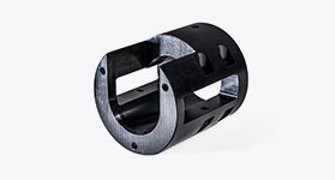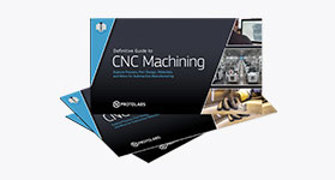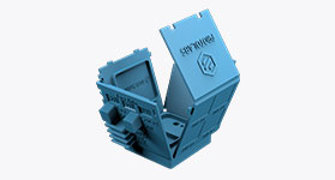
Machined Titanium Puts New Spin on Folding Bikes
Toronto bike maker lightens load of fold-up bike concept with titanium prototypes
Urban dwellers passionate about biking use their two-wheel mounts frequently: commuting to work, running errands, and traversing city trails and paths on the weekends just for fun. Most saddle up every day, weather permitting—sometimes even when weather is not permitting.
Faced with logistical and space challenges that come with crowded city environs, some of these cyclists have turned to using folding bikes. Yet, those folding-bike models haven’t really changed much over the years. Most of these bikes have small wheels, tiny hinged frames, and less than ideal geometry. They ride poorly, are heavy and awkward to use, and, maybe worst of all, they don’t actually fold up that small, which defeats the whole purpose of having a folding bike.
Enter Helix Bikes, a Toronto-based startup bike maker. Nearly four years ago, Helix set out to create a folding bike that is lightweight, durable, rides and feels like a full-size bike, has larger wheels, is safe and easy to use, and folds into a truly small, portable size—a bike that can be stored under your desk, taken on the subway, stowed in the trunk of your car, or packed in a suitcase.
After broad product testing, a wildly successful Kickstarter campaign in 2015, and extensive prototyping help in 2016 from Protolabs, Helix is on the brink of shipping its first bikes to a worldwide market later this year.
“We’re very excited about our product and the impact it will have on the bicycle industry, and also for bicycle manufacturing in North America,” said Peter Boutakis, founder of Helix Bikes.
Design Trials, Funding Triumphs
An inventor, software developer, machinist, and avid cyclist, Boutakis created various folding bike designs over the past decade and has worked with manufacturers in Asia to develop these designs. Helix was an outgrowth of this work and Boutakis’ knowledge and passion for cycling.
After forming Helix, Boutakis and his crew wrestled through early design challenges, as they attempted to transform the fold-up bike concept. But they eventually ran up against financial challenges, too.
Helix turned to Kickstarter in 2015. “We never could have anticipated the incredible support we received through Kickstarter, which helped make our dream of a better folding bike a reality,” Boutakis said.
Just how successful was the Kickstarter campaign? The numbers tell the story.
Helix reached its funding goal of $120,000 in less than one hour. The campaign would eventually attract 1,069 backers who pledged more than $2.2 million, garnering an astounding 1,885 percent of the original funding goal. Helix became the No. 1 funded bicycle product in Kickstarter history, and the second most funded Canadian project in Kickstarter history.
“After being funded on Kickstarter, we had a great opportunity to refine our design even further,” Boutakis recalled. “The unprecedented Kickstarter funding gave us the ability to take the design to the next level—we really pulled out all of the stops.”

Lightweighting with Machined Titanium
As a part of this move to the “next level,” Helix explored a number of different manufacturing processes such as cast titanium and bonding, machining, super-plastic forming, and 3D printing. Ultimately, Boutakis said, Helix settled on CNC machining for the process, titanium for the material.
“We chose titanium because of its light weight, and so, because of the constraints of bicycle design, which requires light weight and strength, machining made the best choice by far,” Boutakis explained. “It also happened to be the lowest cost option for titanium.”
Next, Helix was ready for prototyping. The company turned to Protolabs, Boutakis said, after he had received a recommendation about the company from a friend in the automotive industry. “At this mid-stage of the project, we hadn’t acquired any manufacturing equipment yet, so our manufacturing process had not yet been validated,” Boutakis said. “We needed to outsource the entire build and local shops either wouldn’t touch titanium or came back with very high quotes. Protolabs made it easy and also cost effective to get our parts.”

From CAD Model to Bike Prototype within Weeks
Right from the start, with Protolabs’ automated quoting and design analysis, Boutakis was impressed. “Both the quoting and analysis were amazing. It’s incredible that something as complex as a one-off custom machined part can be quoted so quickly and at such a reasonable price. The ability to change materials on the fly is very useful...we went from CAD model to riding prototype in about three weeks, with Protolabs parts coming in over the course of that time.”
The design process “benefited greatly from having a resource like Protolabs,” Boutakis said. “It removed all of the friction from validating a concept as we could go from CAD to a part we can test very quickly.”
The process, Boutakis said, “allowed us to validate our designs for manufacturability—a reality check was only a quote away...In one specific case it allowed us to verify a part shape that most of our team thought was not possible to machine. Also, in some cases, it helped with costing estimates.”
Protolabs machined a number of titanium parts for Boutakis, all of which, for now, were used for Helix’s prototyping phase. Parts manufactured included rear dropouts, fork components such as the fork crown, a reducer, axle, parts for the bike’s locking mechanism, a seat post binder, stem hinge and more. Protolabs also machined some aluminum and plastic parts, too, such as a seat tube liner.
“Knowing that we can validate a design so quickly allowed us to complete our design process and leave no stone unturned,’ Boutakis said. “Also, the choice of materials available allowed us to fine-tune our design even further by giving us every option and taking out the guesswork of choosing the right plastic, for example. Without a resource like Protolabs, we would be months behind with fewer iterations and the result would have been a less polished product.”

End Result: ‘An Unprecedented Response’
The product so far has received “an unprecedented response from the bicycle community,” Boutakis said. He cites the huge success of the Kickstarter campaign, and reports that “People love that [the bike] is all titanium, which means it rides like a dream, it’s lightweight, durable, extremely corrosion resistant, and it will last forever. Because it is unpainted, it has a simple and pure look...they look beautiful. In a day of stamped, cast, molded, and otherwise mass-produced parts, a bike like ours stands out not only for its design, but also for the way it is manufactured.”
Boutakis added, “Our bikes are manufactured and assembled in Toronto. They will be robotically welded in an inert chamber—we’re the first company in the world to use this process for bicycles. The weld quality is unparalleled in the bike industry and is at aerospace level.”
Helix bikes will be available in three specifications:
- A single speed, $1,200
- A 10-speed derailleur, $1,300
- An 11-speed internal gear hub Alfine, $1,600
Look for these models to roll onto the market later in 2017.





